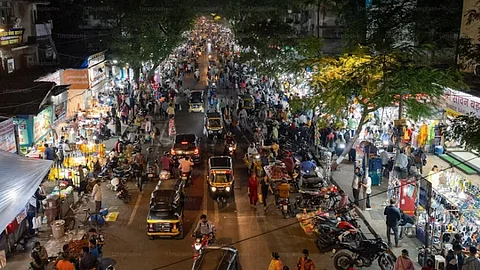Can Mumbai’s Lifestyle Lead to Diabetes? A Doctor’s Viral Post Sparks Debate
Mumbai, popularly referred to as the "City of Dreams," is a city of dreams for millions. Yet, it is also a city that exacts relentless grit from many. The fast-paced life of Mumbai has ignited renewed debate, after a viral social media post by diabetologist Dr. Rahul Baxi, who posted the case history of a patient whose uncontrolled diabetes was fuelled by a strenuous daily routine.
Dr. Baxi pointed out the challenges of a gentleman living in Vasai and who works in a bank in Sion. His routine is such that he has to leave home at 6:30 AM and come back home at 10 PM. Dr. Baxi initially intended to recommend to the patient taking 7-8 hours' sleep in order to regulate his diabetes better but soon understood the impossibility of this recommendation. "Was going to inform him that it's necessary to sleep for 7-8 hours because it will regulate diabetes. Then understood that he's home only for 8 hrs 30 mins. Has a family too," he posted.
This entry struck a chord with most who share the same predicaments in Mumbai. Social media was filled with comments from their own experiences, with one person saying, "Life in Mumbai is brutal. It is a place everyone should live once but only as a bachelor. Unless you have parents who bought a flat in South Mumbai or in Bandra/Andheri, leave Mumbai before you get married".
The Contribution of Mumbai Lifestyle to Health
The high cost of living, congested public transportation, and long commute times in Mumbai have a direct effect on the well-being of residents. Research has shown that chronic stress, sleep deprivation, and poor eating habits are all factors contributing to lifestyle diseases like diabetes, hypertension, and cardiovascular ailments.[2] The World Health Organization (WHO) has consistently noted that sleep deprivation and chronic stress are both significant risk factors for metabolic disorders like Type 2 diabetes. [2]
Commuting in Mumbai is usually a matter of hours spent in crowded trains and traffic jams, with little time for self-care. The average daily commute for a Mumbaikar can be between 2-5 hours, as per a report by the Mumbai Metropolitan Region Development Authority (MMRDA), taking a toll on work-life balance and personal well-being. [3]
The Economic Reality of Living in Mumbai
Housing affordability continues to play a central role in determining life in Mumbai. According to a survey conducted by real estate consultancy Knight Frank, Mumbai is among the least affordable housing cities globally. [4] With increasing real estate prices, most professionals have to commute from far-flung suburbs such as Vasai, Virar, and Kalyan, resulting in an enhanced travel time and daily fatigue.
The Way Forward
Experts are of the opinion that some of these woes could be redressed by infrastructure development in Mumbai, including a widening of the metro connectivity as well as upgrading work-from-home policies. Business houses are also being urged to implement flexible hours of work for the purpose of minimising stress amongst employees. Urban development also needs to ensure affordable residences near business locations to minimise working hours and help residents feel more comfortable.
Dr. Baxi’s post continues to spark discussion online. People commented that it serves as a stark reminder about how Mumbai offers immense opportunities, but it comes at a cost—one that affects both physical and mental health. The challenge remains in striking a balance between ambition and well-being in this ever-demanding metropolis.
References:
Singh, R., & Mehta, K. (2020). "Impact of urban lifestyle on health in metropolitan cities of India." Journal of Public Health Research, 9(2), 112-119.
World Health Organization (WHO). "Sleep deprivation and metabolic health risks." Available at: https://www.who.int
Mumbai Metropolitan Region Development Authority (MMRDA). "Commuting patterns and urban stress." Annual Report 2022.
Knight Frank India. "Mumbai’s housing affordability index report, 2023." Available at: https://www.knightfrank.co.in
(Input from various sources)
(Rehash/Pragati Sakhuja/MSM)


